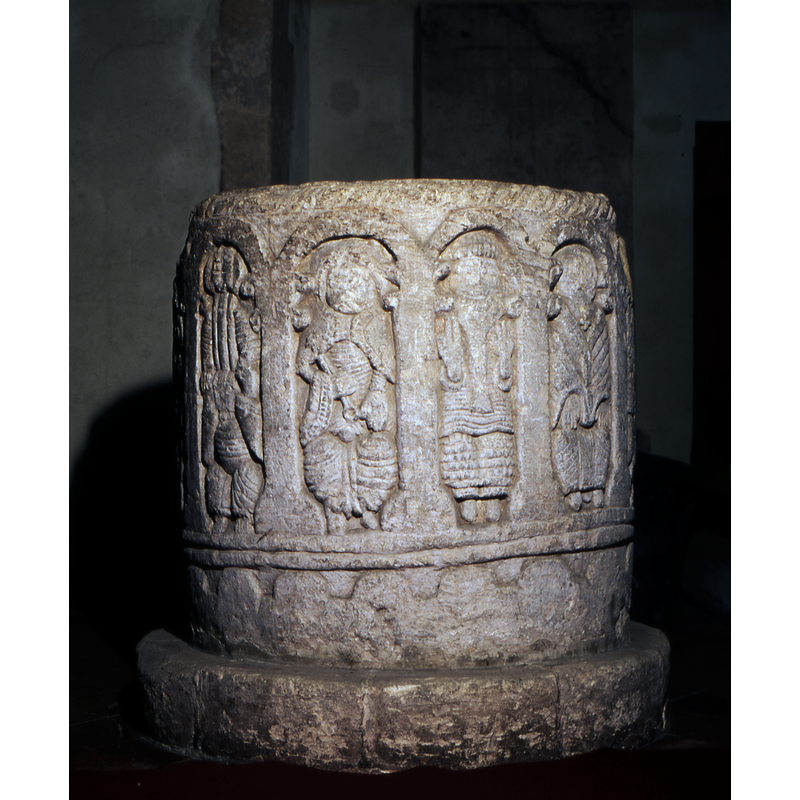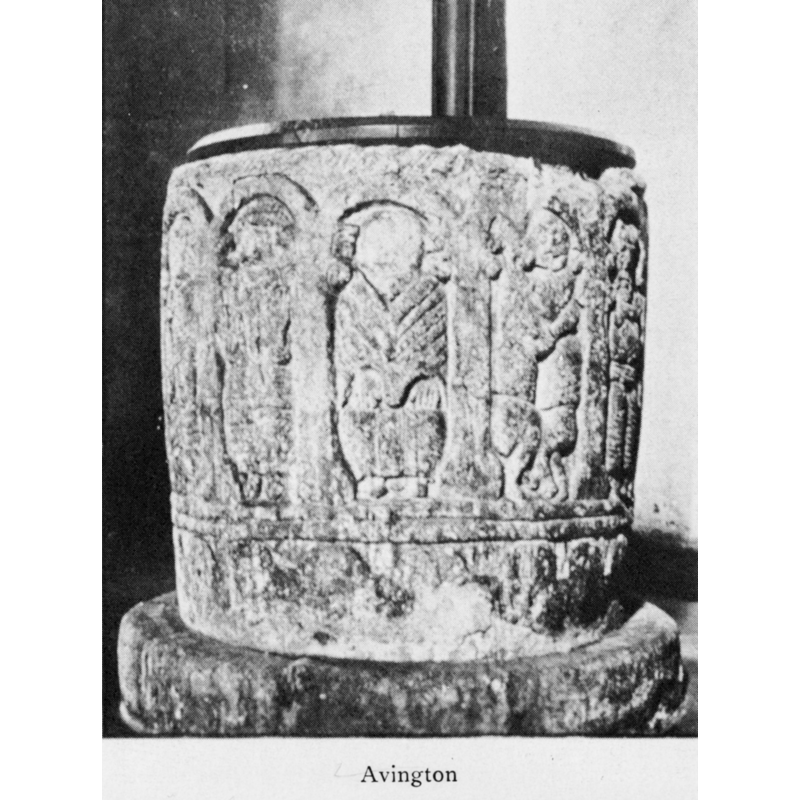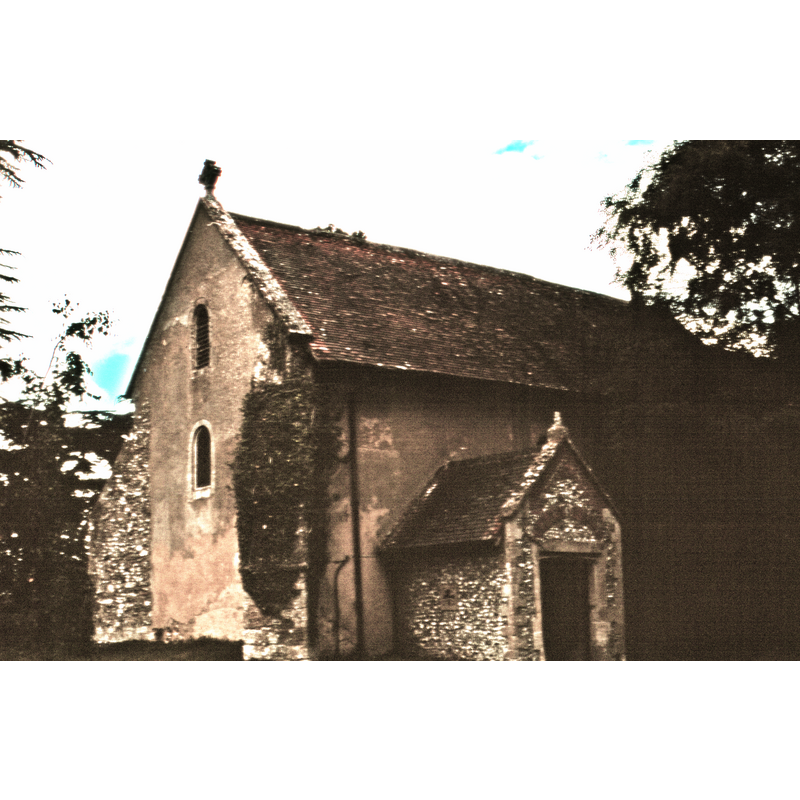Avington No. 1 / Aventon / Avienton / Avington / Avintone

Image copyright © Baptisteria Sacra Index, 2023
CC-BY-NC-ND-4.0
Results: 14 records
view of font
view of font and cover
design element - motifs - rope moulding
design element - architectural - arcade - round arches - 11 arches
Scene Description: short arches supported by full columns with capitals and bases; each arch contains a full standing figure
Copyright Statement: Image copyright © Baptisteria Sacra Index, 2023
Image Source: digital image of a photograph taken 20 July 1998 by BSI
Copyright Instructions: CC-BY-NC-ND-4.0
design element - architectural - arcade - round arches
design element - motifs - roll moulding - double
animal
Scene Description: some animals are outlined below the arches of the lower arcade; the stone is very worn now and their shapes are diffucult to discern
Copyright Statement: Image copyright © Baptisteria Sacra Index, 2023
Image Source: digital image of a photograph taken 20 July 1998 by BSI
Copyright Instructions: CC-BY-NC-ND-4.0
view of church exterior - southwest view
view of church exterior - churchyard, cemetery
view of font
view of font
view of basin - detail
Copyright Statement: Image copyright © Martin Beek, 2005
Image Source: digital photograph in FLICKR [www.flickr.com/photos/oxfordshire_church_photos] taken by Martin Beek 30 May 2005
Copyright Instructions: PERMISSION NOT AVAILABLE -- IMAGE NOT FOR PUBLIC USE
view of basin - detail
Copyright Statement: Image copyright © Martin Beek, 2005
Image Source: digital photograph in FLICKR [www.flickr.com/photos/oxfordshire_church_photos] taken by Martin Beek 30 May 2005
Copyright Instructions: PERMISSION NOT AVAILABLE -- IMAGE NOT FOR PUBLIC USE
INFORMATION
Font ID: 00281AVI
Object Type: Baptismal Font1
Date Visited: 1998-07-20
Font Century and Period/Style: 11th - 12th century, Norman
Cognate Fonts: [cf. FontNotes]
Church / Chapel Name: Parish Church of St. Luke and St. Mark
Font Location in Church: Inside the church, NW corner of the nave
Church Patron Saint(s): St. Luke & St. Mark
Church Notes: The church is in a solitary location and set in trees planted by Kennet. Norman chancel arch and font.
Church Address: Avington Road, Avington, Berkshire, RG17 0UL, United Kingdom
Site Location: Berkshire, South East, England, United Kingdom
Directions to Site: Located 10 km W of Newbury on the A4. 3 km E of Hungerford
Ecclesiastic Region: Diocese of Oxford
Historical Region: Hundred of Kintbury Eagle [in Domesday]
Additional Comments: Cylindrical bowl mounted on low plinth. The bowl has two registers as at Avebury. The lower register has outline of crouching animals. The upper register, which is 4/5 of the bowl, has an arcade around the bowl with 11 arches. Starting on north side, arch no.1 has two figures. Left figure, full frontal and wears a crown, round object on chest - perhaps being held - has broad waist band with zig-zag motif. The figure on the right stands in profile, holding his head - separate from the body. Arch no.2 (left to right) has a bishop or priest with a chasuble and holds bacchulum staff to the right. Upper part of arch is broken. Arch no.3 has a figure crouching - holding another figure ? Arch no.4 full-frontal figure holding a sceptre. Arch no.5 a figure stands frontal, wears a chasable, a collar, stole. His right hand two fingers up in sign of benediction. The left hand, palm up and held upward. He wears elaborate robe. Arch no.6. has seated figure, chasable, elaborate robe and wears a small cross hanging from the neck. Arch no. 7 contains two figures, the upper part is broken. The two figures are embracing or fighting. The upper part is human and the lower part is animal. ARch no. 8 contains a full-frontal figure, long mustache and beard, right arm comes across his neck to his left shoulder and reveals his palm - as a swearing or oath taking gesture. His left arm is raised to his right elbow - supporting the right arm. Wears a wide belt. Arch no.9 appears to be a woman, wearing an ornate dress and cape with a clasp on the chest (has long hair). At the opening of the cape, over the public area, is an open palm - a very odd gesture. Arch no. 10 contains a male figure, full frontal, sitting. The right hand holds a large scroll to his left side. The sleeve has an enormous hang - very wide at the wrist. No. 11 has a figure in profile, the left hand is raised up to the front - the right hand wraps around his waist to his left side. He is wearing below the knee, draped dress. The clothing on these figures seem like armour - roman armour or later 16th century armour. Reminds me of celtic style of figures. A tin lining in the font with a wooden lid. Posts evident from an earlier lid attached to font.
Font Notes:
Click to view
There is an entry for this Avington [variant spelling] in the Domesday survey [http://opendomesday.org/place/SU3768/avington/] [accessed 21 May 2015], but it mentions neither cleric nor church in it. A font here is noted and illustrated in Lysons (1806), In Upcott (1818) as a baptismal font with figures. Murray (1882) reports "a rude Norm[an] font" in this church. Romilly Allen (1883-1884) notes: "The Evil One, in his character of the tempter, is carved on a Norman font at Avington, Berkshire. The Devil in this case has hoofs, and is whispering in the ear of a woman with her tongue out." Described in Cox & Harvey (1907) as an early Norman cylindrical font with thirteen figures under the round arches which rest on Corinthian capitals, supposedly the twelve Apostles and the Fiend tempting Judas. Described and illustrated in Bond (1908): the top and bottom diameters almost equal; the basin rests on a wider circular plinth. Keyser (1910) reports "a very remarkable font" here and refers to Lyson [cf. supra]; Keyser (ibid.) points out the contrast between the skillfuly executed architectural motifs and "the want of skill shown in the designs and proportions of the human figures associated with them". Keyser (ibid.) remarks that Avington is not reported in the Domesday survey, so the font cannot be of such early date, but of the date of the church itself, which Keyser estimates at the mid-12th century NB: just because the church is not mentioned in Domesday does not mean one did not exists there]. Described in Tyrrell-Green (1928) as a baptismal font of the Norman period ornamented with figures that "are unconnected one with another, each figure occupying a bay" of the arcade. Holmes (1922) notes: "The font has grotesque sculpture upon it, the subjects being doubtful." The Victoria County History (Berkshire, vol. 4, 1924) notes: "With the exception of the vestry and porch the building is of 12th-century date [...] The font is unmounted and of cylindrical barrelshaped type, 28 in. in diameter at the top and 27 in. high. It stands on a plain circular plinth and is of hard white freestone. The surface is carved with an arcade of eleven semicircular arches resting on plain pillars with Corinthianesque capitals, above which, round the upper edge, is a band of cable moulding, and at the base a series of raised scallops or smaller semicircular 'arches.' Within the arches of the arcade is a series of sculptured figures of archaic type, nine single and two pairs, most of which are elaborately vested. The proportions of the figures, which are 16 in. high, are in some instances grotesque and the scheme of the carving very obscure. [...] The font is contemporary with the main fabric." The VCH entry (ibid.) refers to entries in both Lyson and Keyser [cf. supra]. Buck (1951) notes that "the Twelve Apostles" is a "subject is carved on over twenty other fonts in various parts of the country" and mentions those at Avington (Berkshire), Gloucester Cathedral, Micheldean and Rendcomb (Gloucestershire) and Chirton (Wiltshire) as examples of the group. Jenkins (1999) calls it "the treasure of the little church at Avington" and describes the scenes/figures as "unclear but one shows a couple kissing: either a man and woman or Judas kissing Christ. Another has the Devil tempting Judas." On-site notes: cylindrical bowl mounted on low plinth. The bowl has two registers as at Avebury. The lower register has an outline of crouching animals; the upper register, which is 4/5 of the bowl, has an arcade around the bowl with 11 arches. Starting on the north side, arch no.1 has two figures: the left figure, full frontal and wears a crown, round object on chest - perhaps being held - has broad waist band with zig-zag motif; the figure on the right stands in profile, holding his head - separate from the body. Arch no.2 (left to right) has a bishop or priest wearing a chasuble and holding a bacculum/staff to the right; the upper part of arch is broken. Arch no.3 has a figure crouching - holding another figure ? Arch no.4 full-frontal figure holding a sceptre. Arch no.5 a figure stands frontal, wears a chasuble, a collar, stole; his right hand raised with two fingers up in sign of benediction; the left hand, palm up and held upward; he wears elaborate robe. Arch no.6. has seated figure, chasuble, elaborate robe and wears a small cross hanging from the neck. Arch no. 7 contains two figures, the upper part is damaged; the two figures are embracing or fighting; the upper part is human and the lower part is animal. Arch no. 8 contains a full-frontal figure, long mustache and beard, right arm comes across his neck to his left shoulder and reveals his palm - as a swearing or oath taking gesture; his left arm is raised to his right elbow - supporting the right arm; he is wearing a wide belt. Arch no.9 contains a figure, apparently female, wearing an ornate dress and cape with a clasp on the chest (has long hair); at the opening of the cape, over the pubic area, is an open palm - a very odd gesture. Arch no. 10 contains a male figure, full frontal, sitting; his right hand holds a large scroll to his left side; the sleeve has an enormous hang - very wide at the wrist. Arch no. 11 has a figure in profile, the left hand is raised up to the front - the right hand wraps around his waist to his left side; he is wearing below the knee, draped dress . The clothing on these figures looks like armour and the figures themselves are reminiscent of a "Celtic" style/flavour. A tin (lead?) lining in the basin well; font with a wooden lid; iron staples evident from an earlier lid attached to font. This font is fully described and illustrated in the CRSBI (2008).
COORDINATES
UTM: 30U 606720 5696475
Latitude & Longitude (Decimal): 51.409445, -1.465531
Latitude & Longitude (DMS): 51° 24′ 34″ N, 1° 27′ 55.91″ W
MEDIUM AND MEASUREMENTS
Material: stone, type unknown
Font Shape: cylindrical, mounted
Basin Interior Shape: round
Basin Exterior Shape: round
Drainage System: centre hole in basin & base
Drainage Notes: lead lining
Rim Thickness: 8-10 cm*
Diameter (inside rim): 55-57 cm*
Diameter (includes rim): 74-75 cm*
Basin Depth: 40 cm*
Basin Total Height: 68 cm*
Height of Base: 12 cm*
Font Height (less Plinth): 80 cm*
Notes on Measurements: * BSI on-site
LID INFORMATION
Material: wood
Notes: Plain wooden lid
REFERENCES
- Victoria County History [online], University of London, 1993-. URL: https://www.british-history.ac.uk.
- Allen, J. Romilly, "Notes on Early Christian Symbolism", N.S., VI, Proceedings of the Society of Antiquaries of Scotland, 1884, pp. 380-464; p. 428
- Bond, Francis, Fonts and Font Covers, London: Waterstone, 1985 c1908, p. 37, 126, 139, 143 (p. 142 for ill.)
- Buck, A.G. Randle, "Some Wiltshire fonts. Part II", LIV, CXCIV (June 1951), The Wiltshire Archaeological and Natural History Magazine, 1951, pp. 19-35; p. 26
- Corpus of Romanesque Sculpture in Britain and Ireland, The Corpus of Romanesque Sculpture in Britain and Ireland, The Corpus of Romanesque Sculpture in Britain and Ireland. URL: http://www.crsbi.ac.uk.
- Cox, John Charles, English Church Furniture, New York: E.P. Dutton & Co., 1907, p. 186
- Holmes, Edric, Wanderings in Wessex: an Exploration of the Southern Realm from Itchen to Otter, London: Robert Scott Roxburghe House, [1922]
- Jenkins, Simon, England's Thousand Best Churches, London and New York: Allen Lane, the Penguin Press, 1999 [2000 rev. printing], p. 16
- Keyser, Charles E., "Notes on the churches of Boxford, Avington, Ashbury, Uffington and Longcot", 16, No. 1 New Series (April 2010), Berks, Bucks & Oxon Archaeological Journal, 1910, pp. 1-8; p. 4, 5
- Lysons, Daniel, Magna Britannia, being a concise topographical account of the several counties of Great Britain, London: Printed for T. Cadell and W. Davies, 1806-1822, vol. 1: 207
- Moule, Thomas, The English counties delineated; or, A topographical description of England [...], London: George Virtue, 1837 [vol. 2], vol. 2: 8
- Murray, John [the firm], Handbook for travellers in Berks. Bucks and Oxfordshire, including a [...], London: John Murray, 1882, p. 69
- Tyrrell-Green, E., Baptismal Fonts Classified and Illustrated, London: Society for Promoting Christian Knowledge: The Macmillan Co., 1928, p. 17, 77, 79
- Upcott, William, A bibliographical account of the principal works relating to English topography, London: Printed by Richard and Arthur Taylor, 1818, p. 12


